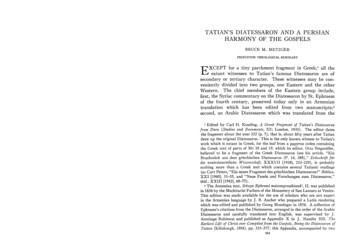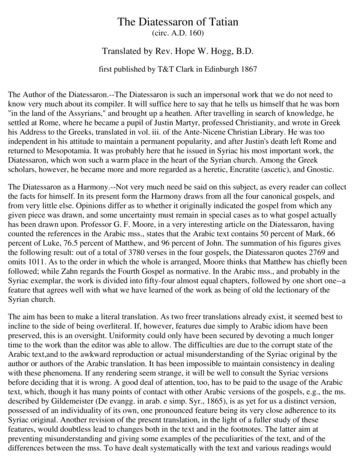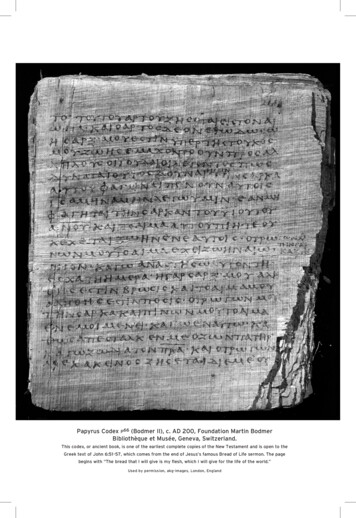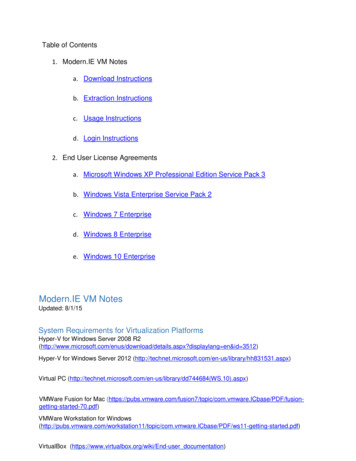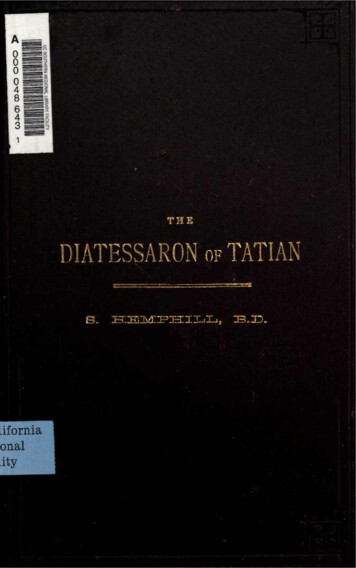
Transcription
jIL.,TATIAN33 -ID.
THEDIATESSARONOFTATIANA HARMONY OF THE FOUR HOLY GOSPELS COMPILEDINTHE THIRD QUARTER OF THESECOND CENTURY;NOW FIRST EDITEDINAN ENGLISH FORMWITHINTRODUCTION AND APPENDICES.REV.SAMUEL HEMPHILL,B.D.,PROFESSOR OF BIBLICAL GREEK IN THF. UNIVERSITY OF DUBLIN.LONDONHODDER&:STOUGHTON,Row.27 PATERNOSTERDUBLIN:WILLIAM M c G E E,18NASSAU STREET.1888.Entered at Stationers' HaU.\[All Rights Resen ed.
PRINTED BYSEALY, BKYEKS AND WALKKR,MIDDLE ABBKY STItBET,DUBLIN.
TO MY FATHER,ROBERT HEMPHILL,OFSPRINGHILL, INTHE COUNTY TIPPERARY:A MEMBER OF THE GENERAL SYNODOF THE CHURCH OF IRELANDEVER SINCEITSFIRSTSESSION:A SUPPORTER OF THE CAUSE OF THE ORPHANA RELIABLE FRIF.ND:ANDA GOOD FATHER.2093548
PREFACE,THEof a nd pebbles which wethe matrix of a conglomerate rock, mustitself.patchworkshellsfindfirsthave had a separate existence grinding themselves smoothon the troubled sea-shore. So it is but a truism to say,which Tatian knew and valued as thethe recordsthatauthentic form of apostolic tradition, and from which hecompiled his Harmony, must have had an assured positionHe knew at any rate he used no others.in his time.And he wasthe friendlivedand taughtsamecircle ofenemies;Theyin the;were persecuted by the sameperhaps hid in the same catacombs.acquaintancesworshippedAnd whenand pupil of Justin Martyr.same city were receivedin the;the friends wanted to strengthen or comfort onewe mayanother, in the face of danger or difficulty,believe that they quoted the Saviour's words,welland recountedHis deeds, out of the same Gospels.Buttoof Justin,firstadmit that the Gospels of Tatian were the Gospelsis to bring them back to the very threshold of thecentury, to a period in which veryfriends of the apostlesmust have beenmanyalive,personaland abletotestify to the genuineness of their writings.Ithas been an ever-increasing pleasure tothis littleandbook:metoand, though keenly sensible offailings, still Iworkitscannot but take a certain pride inbatfaultsit,as
TATIAWS GOSPEL DIATESSARON.ivthefirstedition in whichtheearliestHarmonyof theGospels has become accessible in any form to the Englishstudent.have most thankfully to express my obligations toDr. Salmon, Provost of Trinity College, and to Dr. Gwynn,IRegius Professor of Divinity in the University of Dublin,for their unfailing kindness in helpingat various times duringmyand encouraging mestudy of the subject.Professor of Ecclesiastical History, has alsoDr. Stokes,shown mostgenuine sympathy and interest in the work. While amongmy contemporaries, I have to acknowledge valuableRev. William Colgan, and the Rev. H.Jackson Lawlor, B.D. to the latter of whom it is due tosay, that his kind and acute criticisms have contributedhelp fromthe;tomakethebooklessunworthy of consideration bycompetent judges.S.TRINITY COLLEGE, DUBLIN,igeA October, 1888.H.
CONTENTS,PAGE.INTRODUCTION.i.n.in.The Man Tatian.The Diatessaron in the Early ChurchThe Recovery of the DiatessaronTATIAN'SGOSPEL DIATESSARON,vii.x.xx.the contents in-according to the Arabic, and thefragments contained in the Commentary ofdicatedEphraem Syrustranslatedand arranged.i.53\PPENDIX A.The HypothesisAPPENDIXTheof aGreek OriginalB.Capita of the Latin Harmony, reprintedfrom Ranke's edition of the Codex Fuldensis55\PPENDIX C.The Epitomeconstructedsome Greekfromfragments by Luscinius.63APPENDIX D.Western Influence of the DiatessaronMiddle Ages.in.the.70APPENDIX E.Peculiar readings of theEphraemtheir relation to the Arabic,and the Peshitto.fragments,inthe Curetonian,.74
INTRODUCTIONI.THE MAN TATIAX.THECity of Rome the Eternal City, as it is called haswitnessed many a strange revolution of the wheel ofFortune.This very year a book has there issued from the press,which well illustrates the truth of this remark. It is anArabic work of the tenth century, a translation of a lostSyriac original and it bears on its title page the famousname of "Tatiaris Harmony of the Gospels" while itsinscription is to Pope Leo XIII. as the choicest offeringwhich the Scribes of the Vatican library could contributetowards the recent celebration of his Jubilee.Yet, seventeen centuries ago, what heartburnings the verymention of that same Tatian would have caused in theChurch of RomeAnd how many painful incidents couldthe elder Christians of that city have then recounted, of thecontroversies which had raged round his person some score ofyears before, and which had led to his withdrawal from amongthem, branded with the stigma of heresy, and mayhapdenounced by the then Pope as a foe to ChristianityNow, it would be hazardous to assert that these earlyRoman Churchmen were wrong in the verdict which,informally at least, they pronounced upon the opinionsand teaching of Tatian.;!!1Tatiani Evangeliorum Harmoniae Arabice nunc primum ex duplicicodice edidit et translatione Latina donavit P. Augustinus Ciasca, &c.Romae, 1888.
TATIAWS GOSPEL DIATESSARON.viiiWehave at present no means of knowing the exactnature of that verdict, still less the grounds on which itrested.That Tatian held strange and even heretical notionsabout the spirit-world unworthy conceptions of the Creator ;and unholy and debased views of marriage, must be conceded 1 ; and from all that we can learn about the natural;temper and disposition of the man, they would probably leadhim to expound and enforce these with extraordinarywarmth and even bitterness, 2 to the great detriment ofconcord, and the consequent weakening of the Church.Still, as we have to depend on the statements of adversaries3only, the greater part of his own voluminous writings havingperished, we are surely justified in thinking that popularprejudice, then as now, may have had a large share in thepreparation of the hated roll of heretics ; and that Tatianwas far from being as black as he was painted in the controversial treatises of a later age.Allowance must also be made forone whosewas solifechequered.Born early in the second century in the far East ; trainednot only in his native Syriac, but in the philosophy andfilled, while yet a boy, withpolite literature of the Greeksan insatiable thirst for knowledge ; a traveller, like Mahomet,;through many countries in search of truth ; initiated intothe inner mysteries of the heathen cults ; and then at lastwhen weary and heart-sick with the cruelty, immorality anddishonesty of paganism, captivated and entranced by thesimple charm of the Sacred Scriptures the barbaric lettersupon which by a Divine chance he one day lighted.next find him at Rome an ardent convert, and a pupilWe1and opinions see Iren. i. 28. I.13 Clem. Al. Strom, iii. 12Euseb. H.E. iv. 29iJerome de vir. il. 29., Praef.in Com. in Tit., adv. Jovin. i. 3Theodoret Haer. Fab. i. 20 besideswhat Tatian says of himself in his Oratio contra Graecos ciiaps. 29,andFor the allusions to Tatian'siii.23. 8.Rhodon:lifeEuseb. H.E.Epiph. Haer. 46.inv.:::::35. 42.2 See OratioChaps. 2, 3, 8, 10, 14, &c., for hisagainst the heathen.3methods of controversyEusebius. H.E. iv. 29, says that he left a great multitude of writand alludes to his work on the Pauline epp.Rhodon I.e.mentions his work on problems connected with the hidden and obscureClement I.e. mentions a work by him onthings of the sacred writings.Christian perfection and the Oratio itself mentions azoological treatiseby its author. Chap. 15.ings;:
INTRODUCTION.of the sainted Justin, whose martyrdom he very nearlyshared.Like Justin also, he gave public instruction inChristianity, and wrote a powerful and most interestingApology, the only work of his which has hitherto been1recognized as extant.It is from the autobiographical portion of this Apologythat we glean what little we know of his early life and con2version ; but incidentally also from its abrupt, incisive, andunusual tone, we are able to gather much about the characterof the writer.3Unlike the broad and philosophic Justin, Tatian flingsfrom him every vestige of respect for Greek literature andHis " Apology " is one sarcastic exposure of theculture.weakness and wickedness of heathenism. The vials of hisirony and anger are poured forth to such an extent that weinsensibly think of him as a man of audacious, uncompro-and peculiar mind, neither caring for the feelings,nor respecting the traditions of those from whom he had forever separated ; and whom he had come to 'regard with ascorn which sought no disguise.mising,Nowthe suspicionisirresistible that the bitternessandnarrowness with which he thus attacked paganish! in hisApology, may in later years have sprung up afresh andwidened the breach which his unusual opinions were alreadyAt any rate he left Rome,causing in the Roman Church.as I have said, smarting under the accusation of heresy, andbeingmadeandto feel that his influence forgood had outlivedwanderings, at last settleddown in his native Mesopotamia, 4 where his "views" wouldcreate no alarm, and where he could feel perfectly free topreach the blessed Gospel after his own notions to his stillunevangelized countrymen. What a lesson for persons whonowadays strike out separate paths for themselves inreligion, and shrink not from sowing disunion, and rendingthe Body of Christ at home, while the hundreds of millionsof heathen lie open before them, stretching out their handsitself;afterperhapsmanyin vain, and crying bitterly for teachers.Of Tatian's last years we are left entirely to conjecture,nor can we be certain of either the place or the date of his1ThebestVol. vi.234ed.of the OratioisOtto.Corpus Apologetarum,Jena.1851.Especially chapters 29. 35, 42.See Prof. Fuller, Art. TATIAN, Encyc. Brit., 1887.Epiph.I.e.
TA TSAN'S GOSPEL DIA TESSARON.xdeath.its1we do know, that his name never recoveredRome, or in the Greek and Latin Churcheswhere for many centuries he was viewed withButthispopularity atgenerally,that peculiar dislikeand distrust which inevitably gatherround a man on whom public opinion has once imprintedits ominous brand of "heretic."the ChristianSuch then is an outline of Tatian's lifeportion of which is thus seen to resolve itself into twodistinct periods, the Roman or Western, in which helectured and wrote in behalf of Christianity, and attainedunpleasant notoriety as a heretic ; and the Syrian or Eastern,in which he probably spent the rest of his days preachingthe gospel on the banks of the Euphrates.:II.THE DIATESSARONINTHE EARLY CHURCH.WE have seen Tatian as a teacher at Rome, and havefollowed him into the obscurity of his Eastern retirement.Let us now pass to consider his Diatessaron, or so-calledHarmony* of the Four Gospels and let us at once face theThequestion, why so little has been hitherto known of it.answer is simply this, that the Diatessaron has been soughtwhere it did not exist, and therefore could not be found. Ithas been tacitly assumed, because Tatian taught at Rome,wrote his other works in Greek, (which was the usual;language at Rome in his day), and gave a Greek name tohis compilation of the Gospels, that therefore it was writtenin Greek, and belonged in a manner to the western sphereof its author's labours.Yet, from the whole body of westernChristian literature which we have before us, it is scarcelypossible to glean any allusion at all to the Diatessaronbefore the middle of the sixth century, when Victor, Bishopof Capua, found an anonymous Latin Gospel-Harmony and1 Itis indeed generally believed that he died in theneighbourhoodof Edessa, about A.D. 180.For the chronology of Tatian's later yearssee Zahn. Tatian's Diatessaron Erlangen 1881, pp. 276-292LightfootArt. in Contemporary Review, May, 1877, p. 1133.For generalinformation about his life see Articles by Dr. Wace in Expositor 1881and 1882 ; Professor Fuller's Art. Tatian in Smith's Diet, of ChristianBiog., 1887 ; and Professor Harnack's Art. Tatian in Encyc. Brit. 1888.2It was not a Harmony in the modern sense of the word, but a kindof patchwork Gospel.Its principle was amalgamation notcomparison ;to use the words of Lightfoot.:
INTRODUCTION.itmust be the work of Tatian. 1 Let usdivide early Christian literature into Latin, Greek, andSyriac, and see what is the conclusion to be drawn from theevidence of each group as to the sphere where the Diatessaron exercised its influence.Not only is there no mentionFirst as to Latin literature.of the Diatessaron in any Latin author before the middle ofthe sixth century, but we can go so far as to say thatLatin Christianity could have known nothing about itbefore that date.Several Latin writers can be mentioned,who could not have failed to have known and noticed the2book, if it had existed in Latin in their day.Victor of Capua himself is an important witness; for hewas skilled in both Greek and Latin, and was a man ofconsiderable eminence as a scholar and controversialist. 3And his solitary reason for attributing his discovery toinferred thatTatian, is that he found one passage in Eusebius which spokeof Tatian having compiled a patchwork Gospel, 4 which hejudged to be the same, substantially, as that which acciNot one other allusiondentally came into his own hands.to Tatian's work does Victor mention ; and the conclusionis, that, but for the statement of Eusebius, he would haveremained perfectly ignorant that such a work had everexisted.Again, Cassiodorus, who was a contemporary of Victor,says nothing about such a work in his Instituta Divina*Neither does Gelasius include it in his Decretum de recipiendiset non recipiendis libris.Jerome is silent as to any Latinversion of it in his strictures on the great multiplication ofLatin bibles.So is Augustine in his treatise, De consensuNor, finally, is there any allusion to theEvangelistarum,in the poet Juvencus, who (A.D. 330) wrote a poeticalGospel History, and had to construct a Harmony for him-bookself.5i Seethe work and Victor's preface in Migne Pat. Lat.Ranke's edition of the Codex Fuldensis. 1868.8MuchPartof the followingis,vol. 68, ora reproduction of the reasoning of Zahn.I.His " most3celebrated work was that on the Paschal Cycle mensmith's Diet, oftioned by several chroniclers and praised by Bede."Xn. Biog. Art. Victor.4Euseb. H. E. iv. 29. 6 Tanavbs crvvd pfidi nva. Kal crwayuyfyi/ OVKolS' faces TWV evayyf\l(av irwdfls, rb Ata reffffdptai' TOVTO irpo Tui 6fta Tev.o nal irapd riffiv tlffrri vvv j fpfrat.5 Pat. Lat. vol.xix., p. 52.
TATIAN'S GOSPEL DIATESSARON.xiiWe conclude then that the book exercised no influenceon Latin Christianity before the time of Victor but that itwould have exercised great influence if it had existed inLatin is evident from the experience of the ninth and following centuries, as will afterwards be shown ;' therefore itdid not exist in Latin, nor did the early Latin Church know;anything whatever about it.Let us now .glance at Greek Christian literature.Itswhole range supplies us with but three references to theBefore we discuss these separately, let us notDiatessaron.fail to remark how strange it is that so little influence shouldhave been exercised on Greek Christianity by a GospelHarmony, compiled by the author of the celebrated Apology,the friend and companion of Justin Martyr.Judged by thee silentio argument, the Greeks were about as ignorant as theLatins of the nature, or even the existence of the Diatessaron.Irenaeus, who held such very strict notions about the2necessity of the fourfold narrative, and who would havebeen shocked at the bare mention of a patchwork Gospel,such as Victor of Capua had found described in Eusebms,3though he twice controverts Tatian's opinions, says notone word of his Diatessaron. It is scarcely possible thento conceive that he had ever heard of the book.In the last chapter of the fifth book of the History ofEusebius, there are several extensive quotations from anauthor who has been supposed to be Hippolytus.Nowtwo things may be distinctly proved from the way in whichTatian's name occurs in these extracts.The first of theseis that the author could not have been Hippolytus ; forHippolytus speaks with disfavour of Tatian, and mentionshis heresy, whereas the extracts place Tatian's name in thehonourable company of Justin, Miltiades, Clement, and manyothers, who wrote against the heathen on behalf of the truth,and who controverted the heresies of their day. Photiussays that the author of these extracts was Caius, and Dr.Salmon 4 strongly inclines to this view.But the secondIt ispoint is of greater importance in the present enquiry.thisthat the author mentions the fact that the followersof Artemon had shamelessly tampered with Scripture, 5 yet:1See Appendix DSalmon. Introduction to the N.T. pp. 38-9.2345i.28.Iandiii.23. 8.Introduction to the N.T.p. 55.ypatyas fnev Betas a p6/3(as pepaSiovpyrjicaffi.
INTRODUCTION.quotes Tatian as a defender of the faith, thereby provingthat he had never heard that he acted in a similar manner.But let us get a little closer to the man himself: let usenter the company of those who had personally known himin his better days, and we shall find that though theyresented the errors into which he drifted, they never knewof his treatment of the Gospel.Rhodon, of Asia Minor, undertook to refute his master'swork on the difficulties and contradictions of the Old1Testament, yet we never read that he knew of thework in which he sought to present the Evangelicalnarratives incontradictions.a form free from difficulties and seemingClement of Alexandria, also a supposed2pupil of Tatian, makes several allusions to his heretical3tobutviews,preserves an impenetrable silence asthe Diatessaron.So then we have four men of his time,who were intimate with his writings and opinions, and yetnever heard of his Gospel-Harmony. The conclusion is thatit was not a book which, at first at any rate, exercised muchinfluence on Greek Christianity.But that it did not exercisemuch influence at a later date is evident from the witness of4Hesychius of Jerusalem, more than two centuries later ; for5he says that anyone couldmake a Harmony of all the history,but he never mentions one as having been already madewhich is tolerably clear proof that he had never heard of;the Dialessaron.Let us now consider the three passages of Greek literaturewhich mention the Diatessaron. They are passages of EusebiusEpiphanius, and Theodoret. And, so far as theirconcerned, the conclusion is only confirmed,that the influence of the Diatessaron on Greek Christianitywas nil. Theodoret though he wrote his work on Heresiesin Greek, was the Bishop of a Syrian diocese, and mustbe taken as representing Syrian not Greek Christianity.(see above),evidenceisEpiphanius spoke Syriac as his native language, andisEuseb. H.E. v. 13.Strom, i. I. where he mentions that one of his teachers was "ancf. Oratio ch. I.Assyrian."3Strom, iii. 12.4 He was called " theTheologian," see Smith's D.C.B.5Sore Svt/aa-9atIn Dom. res., Combefis, Auct. nov. i. 765, D.12nva.fi'iav/caretT&VTr/yap/j.oviav K.Kaupaiv rd iv TO. Trap' eKtiffrov yeypa/n/afva ffvvBeirarrjs Iffroplcu epyaffaffBai, Ka.Qa.irep tvbs rbft trtC/xa 7ra TT)sirav yeypacpdros K. ou iro\\ v.Zahn.p. 31,noteI,misquotes,ira, rr)sterrapins.
TATIAWS GOSPEL DIATESSARON.xivtherefore not a pure representative of Western ideas andAnd Eusebius was a man of such wideknowledge.acquaintance with the history and literature of both theEast and West (though probably not a good Syriac scholar),that the fact of his knowing a work would not prove that itwas generally known by other Greeks of his day.We shall, however, take Eusebius and Epiphanius asfairrepresentatives of Greek Church literature, and examineevidence as to the Diatessaron. Eusebius saystheir:"Tatian composed anot how, of the Gospelscurrent in:1sort of connexion and compilation, I knowand called it rb Stct rfffcrdpuv. This work issome quarters evenNow Zahnto the presentand other goodday."regard it as certain fromthese words that Eusebius himself had never seen the DiatesHe calls it a sort of connexion and compilation ofsaron.the Gospels, and he vaguely states that this work is currentin some quarters, (or among some persons), even to thepresent day ; giving us no hint as to where it was current,the kind of persons who used it, or the language in which itwas written. Again consider the confession of ignorancewhich seems to be contained in the phrase, " I know nothow" (OVK oT8' OTTOS). It is, indeed, true that so highan authority as Bishop Lightfoot urges that this expressionin idiomatic English signifies " I cannot think what hecriticswas about," andis equivalent to "unaccountably," "absurdly;" so that, if anything, it implies knowledge ratherthan ignorance of the contents. 2 In support of this contention, Lightfoot quotes twenty-six examples of the use of thephrase in Origen's work against Celsus and lays stress onthe fact that Origen had the work of Celsus before him, andsometimes actually uses the expression of the very passageon which he is commenting. Still it cannot be denied thatthe combination owe oTS' OTTWS is found in Classical Greekto express ignorance* and therefore it is hard to see whyEusebius may not have chosen to employ it in that sense.Besides, as Zahn very forcibly points out, Eusebius, great aliterary critic as he was, has given no description whateverof the plan or principle of Tatian's work, not even in the wayof disparagement ; whereas he has expressed his approval of;1H. E.iv.crvvaQfidi/21.c29, Lightfoot's translations are mainly followed as givenRev.in Cont.,p.nva1136.Kal avvaytey v3arvvGfts.Sophocles, O.T. 1367.
INTRODUCTION.Ammonius, which he knewseems to be, that Eusebius knew the bookonly by hearsay, and being well aware that its author was aheretic, took it for granted that his compilation was a meredistorted Gospel, like that of Marcion and the other Gnosticteachers. At any rate, we know that Eusebius knew of Tatian'swork on the Pauline Epistles, and his Problems, only throughhearsay and his description of the Diatessaron is just whatmight be expected from one who had the same kind of vagueThis being the first attempt of theinformation about it.kind, Eusebius would have nothing to guide him in formingan opinion ; nor could he or any other orthodox writer easilybelieve that Holy Scripture would have been subjected tosuch violent treatment except for heretical purposes andhaving once made up his mind that the book was a sort ofheretical Gospel, we may well believe that he would takeno great trouble to procure and examine it for himself.2Let us pass on to Epiphanius. His words arethe somewhat kindred work ofwell.1Thetruth:;:"The(Tatian).Diatessaron GospelIt is calledissaid to have beenby some the Gospel accordingcomposed by himto the Hebrews."Now these words puzzled critics very much for a longtime;nor was there any ready way of explaining them, except bysupposing that E'piphanius here, as in so many other places,made a blunder. 3 But we must be fair even to Epiphanius.He says, " It is called by some the Gospel according to theHebrews," but as Zahn notices, he himself does not call itso ; and, moreover, whenever he alludes to the Gospelaccording to the Hebrews, he does so quite apart from anyreference to Tatian.His view of the Hebrew Gospel isthat it is a mangled edition of S. Matthew ; so that here hemerely chronicles the mistake of other persons. Does notthis distinctly prove that Epiphanius had never seen theDiatessaron ? And does it not also prove that his informantscould have had but a very superficial knowledge of it? Theis, that the Diatessaron, as we shall presently see, wascurrent in Syriac, and was known to be the work of a heretic ;4at the same time, and in an adjoining tract of country, theHebrew Gospel was used by the heretical Nazarenes ; andcertain Greek-speaking people meeting the two works inabout the same locality, hearing of the heretical authorshipfact1Letter to Carpianus. This argumentthat S. Mat. was the basis of both.2Haer. 46,i34Lightfoot.isstrengthened by the discoveryBeraea, the modern Aleppo.
TATIAWS GOSPEL DIATESSARON.xviof each, and noticing that both were written in orientalcharacters, which they could not read, hastily concludedthat they were one and the same work, and so reported toEpiphanius.So far therefore as early non-Syrian Christianity is concerned, we may safely say that the Diatessaron exercisedand evenpractically no influence before the sixth centurythe little that we do read of it in Eusebius and Epiphaniusconfirms the conclusion that it could not have belonged tothat portion of Tatian's life in which he flourished at Rome,:but to that later portion in which he laboured among hisSyrian fellow-countrymen.At any rate history begins to find her voice the momentwe touch Syrian soil and we there find the Diatessaron" at home." Take Theodoret forexample, the Bishop ofIn the year 453 he wrote theCyrrhus near the Euphrates.lfollowing words::"He(Tatian) composed the Gospel which is called Diatessaron, cutting out the genealogies and such other passages as show the Lord tohave been born of the seed of David after the flesh. This work was inuse not only among persons belonging to his sect, but also among thosewho follow the apostolic doctrine, as they did not perceive the mischiefof the composition, but used the book in all simplicity on account of itsAnd I myself found more than two hundred such copies heldbrevity.in respect in the churches in our parts.All these I collected and putaway, and I replaced them by the Gospels of the Four Evangelists."an eye witness who waswho had handled manyAscopies of it, and had minutely examined its contents." The materials before Theodoret wereLightfoot says,ample the man himself was competent to form a judgmentHereat last are the statements ofperfectly familiar with the book,;;Wehave here no vague orhearsay evidence. We are told the exact point in whichTheodoret held the book unorthodox, the sort of personsof two persuasions who used it, their reason for so doing,the number of copies found in one diocese, and the suppression of these to make way for the Canonical Gospels.And the man who gives us all this information, and who wasand the judgmentisexplicit."well acquainted with the past history of his Church, accepted it as an undoubted fact that the work had been comIndeed, we may well believe that thispiled by Tatian.very point, its heretical authorship, weighed more with thezealousbishopthan any1Haer.internalP'ab.i.20.defectsuchasthe
INTRODUCTION.omission of the genealogies and that he acted very muchas a Romish bishop in Ireland would act at the present dayin suppressing the Protestant Bible wholesale just because itwas Protestant ; the only difference being that the Syrian"" heretical " book"Catholicby the morereplaced theform of the Gospel, a precaution which would be deemed;quite unnecessary by theRoman prelate.us to picture the scenes which tookplace when Theodoret and his archdeacon and other subordinates went round the diocese of Cyrrhus seeking out theold Harmony, and confiscating it, to the chagrin of theIt isnotdifficult forsimple parish priests and their simpler flocks, who had beenaccustomed from infancy to hear from its pages the story ofredeeming love. We feel sure it must have been endearedto them as an old-fashioned Church book which had comedown to them encased in the love and veneration of ages,and the subject of many stories of the olden days of SyrianChristianity.Of these stories a specimen may be found in a curious oldSyriac composition which has comparatively recently been"lbrought to light. It is called the Doctrine of Addai," andit gives a kind of romantic account of the founding of theChurch of Edessa in the time of good King Abgar." Andthey ministered in the church which Addaeus had built at theorder and command of King Abgar, and they were furnished with whatbelonged to the king and to his nobles with some things for the house ofGod, and others for the supply of the poor. But a large multitude ofpeople assembled day by day, and came to the prayers of the service,and to the reading of the Old Testament and the New of theDiatessaron." 2Nowthe very least that can be saidis,thatat thetimeromance was written, the Diatessaron must have beenthe form in which the Gospel was commonly read in the3AndSyrian Churches with which the writer was familiar.thisThere are two editions. The earlier was prepared by Cureton, andpublished after his death, in Ancient Syriac Documents (London, 1864).The later and more complete edition is that of Dr. Phillips. TheDoctrine of Addai (London, 1876).The MS. which Dr. Curetonfollowed here reads Ditornon. Thisthe editor conjectured to be a corruption of Diatessaron, p. 158,note.The conjecture was proved correct by Dr. Phillips' MS., whichreads Diatessaron.See Lightfoot, p. 1,137, note.tword3Itdoes not follow because a document is apocryphal that its evidencefact is worthless.See Dr. Salmon. Expositor, 1887.on a matter ofvol. vi., p. 9.
xviiiTATIAWS GOSPEL DIATESSARON.as the composition may perhaps date back as early as thethird century, this would prove that for nearly two hundredyears the Diatessaron was a well-known book amongthe Syrians, and that many ages before the visitation whenthe orthodox bishop went round from one parish to anotherto suppress it, the simple country folk (like Englishmen atthe time of the Reformation), had been accustomed to gatherround, and drink in attentively the words of eternal life,which were read from its pages, as it lay upon the desk oftheir rural sanctuary.Nor was the use of the Diatessaron confined to the uneducated classes. Two great figures shine out brightly inThese arethe Syrian Church History of the 4th century." the" the Persiansage," and Ephraem,HarpAphraates,of the Holy Spirit." The one was a great teacher at Mossul(Nineveh), about A.D. 340 the other lived and labouredat Edessa, about twenty years later.Now we have more or less convincing evidence that eachof these men used the
the diatessaronoftatian aharmonyofthefourholygospelscompiled inthethirdquarterofthe secondcentury; nowfirsteditedinanenglishform with introductionandappendices. rev .
